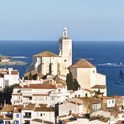When on 28th June the government of Serbia, led by the hyper-pragmatic prime minister Zoran Djindjic, extradited Slobodan Milosevic to the Hague war crimes tribunal, many in the west acclaimed the Serbs for rejoining the European family of nations. But this compliment did not make me happy.
Western Europeans have never had much interest in Serbia, the Balkans or indeed eastern Europe. Most associations they do have are negative ones. Only experts on the region know that Serbian frescos are an integral part of European medieval art or that Serbian epic poetry is a worthy heir to Homer. Nor am I optimistic about the future: it will be a miracle if Serbia joins the EU in less than 30 years.
I do not doubt Milosevic's responsibility for war crimes. But his extradition was very bad news for the establishment of the rule of law in Serbia and Yugoslavia. The Yugoslav constitution prohibits the handing over of our citizens to foreign countries. The law to amend it was proposed to the federal assembly. When the parliamentary majority rejected it, the government of Serbia passed a decree allowing extradition. But it was in turn declared unconstitutional, both by the constitutional court and by 51 professors at the Belgrade Faculty of Law.
Under Milosevic, many of these professors had defended both the rule of law in and the opposition. But this did not deter Djindjic's cabinet from sending the special police to the central Belgrade jail to tell Milosevic, who had been there since 31st March on corruption charges, to pack his suitcase.
Vojislav Kostunica, the still popular president of Yugoslavia who defeated Milosevic in last autumn's elections, was opposed to the extradition. He accused the Hague tribunal of "selective justice." Why only Serbian, and not also Croatian, Muslim and Albanian leaders? No Croat has yet stood in front of the Hague tribunal for crimes committed against the Serbs in Croatia, of whom half a million were expelled. But Kostunica's party was too isolated inside the ruling coalition, and Serbia too weak to resist western pressure, so he decided not to mobilise his supporters against the extradition.
It was made abundantly clear that without delivering Milosevic we would not be granted aid, that we would have to pay our huge foreign debt under a particularly severe regime and that even private investors would be discouraged. In Serbia, an average monthly wage is around $60 and the country has the largest number of refugees in Europe (perhaps as many as 800,000), most of whom live in abject poverty. But I still think we should be ashamed for having sold our former president for the money of Nato countries which bombed us in the spring of 1999. (I never thought I would write for a western journal telling its readers to think less well of Serbs, but here I am doing just that.)
In any case, $1.3 billion is not that much money in an economy which has for several years withstood international sanctions and two and a half months' military bombardment. The improvement in the standard of living will be slow and people will be disappointed. The government is now freeing prices, in contrast to Milosevic's subsidies for basics like food and electricity. This makes economic sense, but many will be cold and hungry next winter.
Milosevic was extradited on St Vitus Day, which the Serbs devote to the remembrance and mourning of their defeat by the Ottoman Turks in the battle of Kosovo in 1389. It is enshrined in the Serbian collective memory as the most sacred date in our history. I suspect the Americans insisted on this date, since the members of their foreign policy establishment often recall how in Kosovo in 1989, at the battle's 600th anniversary, 1m Serbs came to hear Milosevic, then at the peak of his popularity. But how could our government ever assent to such a humiliation?
For his misdeeds in Kosovo and Bosnia, Milosevic should have been tried in Belgrade. In the Hague he will become a martyr for many Serbs. Opinion polls show that even among those Serbs who were in favour of extradition (around one third) the Hague tribunal is seen as a political instrument.
And the tribunal is a flawed judicial institution. It would not be acceptable anywhere in the west. The pre-trial detention is exceptionally long (some defendants have been waiting for two years). The judges often yield in opinion to the prosecutor. Many witnesses are anonymous, which makes their interrogation by defence lawyers very difficult. And proceedings are sometimes closed to the public. The main suppliers of evidence for indictments are the intelligence agencies of Nato countries. It is unlikely that Milosevic, if he changes his mind and decides to defend himself, could get as witnesses leading western diplomats with whom he made secret deals. Would the US ever allow Richard Holbrooke, its former ambassador to the UN and chief Balkan negotiator, to appear in court? And how could the tribunal subpoena him? All in all, I can already hear my previously Milosevic-bashing Belgraders lamenting: poor old Slobo.











